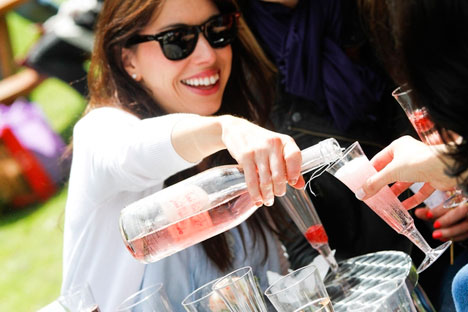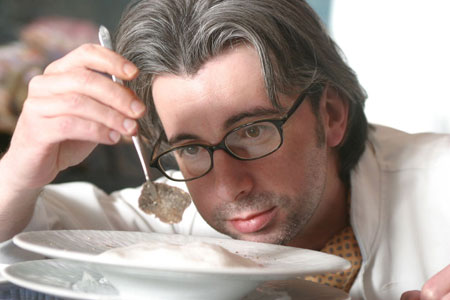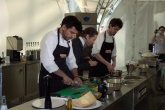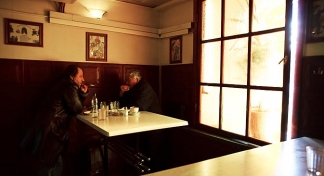City food revolution creates a new world of taste

It would have been unthinkable 10 years ago for Muscovites to be able to enjoy such a wide variety of flavours and styles of cuisine under one (very glamorous) roof; today it is commonplace. Source: Press photo
In little more than 25 years, Moscow has transformed itself from a city that barely had any privately owned restaurants into an increasingly attractive destination for both Russians and visiting gastronomes searching for top-flight international and Russian cuisine. An explosion of younger culinary talent in recent years, combined with a burgeoning interest across Russian society in good food and fine dining, has encouraged the proliferation of many successful new restaurants.
The rise in disposable income across the Russian urban classes has helped fuel this demand, as Russians become far more demanding and discerning in their food choices. The picture today is a far cry from the Moscow of the Seventies and Eighties, when the only eateries available were dire, government-run cafés and the occasionally badly run restaurant, visited by senior party officials. Visitors would sooner starve than dine at these venues, Muscovite officials were fond of saying.
Related:
Of course, Russia’s capital still has a long journey to take before it can offer real competition to the likes of London, Paris or New York. But, crucially, a new “middle-tier” class of restaurant has emerged over the past five years, where diners come for the food rather than just to be noticed. Restaurateurs such as Alexei Zimin, who co-founded the excellent and affordable French brasserie Ragout in 2010, have helped to narrow the gap between fast-food outlets and ludicrously expensive, lavish dining experiences. It is in recognition of this fledgling interest in gastronomy that the Taste Festival organisation will invest in the Russian capital for the first time in 2013.
Interactive workshops
From November 22-24, the inaugural Taste of Moscow food festival will take place in venues across the city, uniting Moscow’s diners and industry stakeholders with some of the most renowned international and Russian chefs working today. Big headline names, including Alyn Williams, will participate in cooking demonstrations, masterclasses and most importantly, engage directly with Muscovites keen to expand their knowledge and palates.
Highlights include the opportunity to take part in three interactive workshops and sample the signatures dishes of Moscow’s leading chefs at nominal prices. Where else could a Muscovite hope to enjoy 10 dishes from restaurants of the quality of Nobu and Hugo in one setting? There is also the added bonus of a guest representation from Croatia, whose top chefs are travelling to Moscow to share secrets of their renowned gastronomic heritage.
The festival first took place in London 10 years ago, and has received widespread endorsement from such famous chefs as Gordon Ramsay and Michel Roux Jr. Although some might question the wisdom of bringing the Taste Festival to a city without a proven gastronomic heritage, managing director of Taste Festivals Justin Clarke is confident that the decision will be vindicated. “When I was approached to organise a Taste Festival in Moscow, my initial reaction was perhaps one of caution, as well as excitement. Food is arguably still relatively virgin territory in Russia and the nation does not have an established heritage of a dining culture and inherent appreciation of good food,” he explains.
“However, one of the key aspects of Moscow’s food revolution that convinced us to organise a festival here is the attitude of openness to other food cultures. This is one of the most attractive things about the culture here; there is a discernible appetite now to be experimental and adventurous with food.”
His claims are borne out by the guest list for the Taste of Moscow Festival. Local participants include such culinary stars as Vladimir Mukhin of Moscow’s White Rabbit restaurant; Dmitry Zotov, brand chef of Restaurant Syndicate, a major holding company uniting a range of premium restaurants; and representatives from the successful Novikov chain of restaurants.
White Rabbit in Moscow is one example of how Muscovite dining habits have evolved. Its internationally seasoned menu offers a panoply of options, including smoked salmon on spinach, risottos, pasta dishes, plus veal steak and rack of lamb – flown in from Italy and New Zealand respectively. It would have been unthinkable 10 years ago for Muscovites to be able to enjoy such a wide variety of flavours and styles of cuisine under one (very glamorous) roof; today it is commonplace.
Vladimir Mukhin, like many of his contemporaries, has travelled and fallen in love with the diverse flavours of Europe and beyond. He claims his restaurant specialises in Russian cuisine, though it’s hard to see many obviously Russian influences in his pan-Italian dishes.
This is perhaps what Moscow still lacks: a core of restaurants that put the emphasis on updating Russian cuisine for the 21st century. The White Rabbit has plenty of similarly trendy and popular competition – Aist, Bon and Carré Blanc to name a few – but it would be difficult to find many Russian classics in their pan-European menus. Restaurants such as Varvary, with its avant-garde take on Russian cuisine do exist, but they are few and far between.
“Haute cuisine is still a very novel concept for Russians,” Varvary founder Anatoly Komm says. “The market for refined, modern Russian cuisine in Moscow is small but growing. However, for a significant majority style rather than substance is the top priority."
Which is why Arkady Novikov has enjoyed such success. Since opening his first venue in 1991, Novikov has become a name synonymous with the local food industry, opening more than 50 restaurants ranging from the lavishly decadent to the buffet chain Yolki Palki.
Novikov understood from the beginning that professional and wealthy Russians wanted to enjoy the hitherto unavailable delights of the world’s finest cuisines in suitable surroundings, rather than hark back to Soviet functionalism. “During the years of the USSR, food was simply about sustenance rather than delighting,” emphasises Mr Clarke. “This is precisely why Moscow has until now largely regarded high-class cuisine as a foreign import, with some notable exceptions,” he adds.
Peasant origins
His comments remind us that Russia’s food foundations were laid firmly by the peasant community, living in often harsh conditions. Poultry, game, fish, rye, barley, millet, berries, beer and vodka were their key staples. If Russian cuisine stands a chance of appealing to both a wider international audience and Moscow’s wealthy elite, then the city clearly needs more chefs like Komm to continue refining and reinventing its gastronomic heritage.
Yet Jeff Tyler, head chef at Novikov’s flagship London restaurant, is convinced that Russian cuisine will eventually enjoy more far-reaching appeal: “Other cuisines – Thai, Italian, etc – are more mainstream and therefore diners are more familiar with them. However, we are seeing cuisines from around the world grow in prominence, for example Korean, which we now offer on the menu at Novikov.”
Mr Clarke is confident that the best is yet to come. “Moscow is still trying to get a sense of what it really stands for, just as London did 20 years ago,” he underlines. “And like our great capital, I’m sure Russia’s dynamic first city will find its feet and gain the confidence to promote and update its gastronomic traditions in time.”
Whatever direction Moscow takes, one thing is guaranteed: residents and visitors alike can no longer complain that their options are limited to the number of fingers on one hand. Today, the dilemma in the capital is where to start.
Culinary star who reinvents tradition

If one chef embodies the exciting new face of Moscow’s gastronomic community, then it is Anatoly Komm.
Since his flagship restaurant, Varvary, entered The World’s 50 Best Restaurants Guide in 2011, the waiting list has become seemingly endless as Russia’s wealthy elite clamour to sample Komm’s remarkable take on traditional Russian cuisine.
Saying Komm is Russia’s answer to the renowned Spanish chef Ferran Adrià is not hyperbole. Like the founder of El Bulli, Komm is a pioneer of experimental “molecular” cuisine – investigating the science of food preparation – and has updated many Russian classics to critical acclaim.
There are few venues in Moscow where diners can enjoy classic Russian dishes such as selyodka pod shuboy (“herring under a fur coat”) which is slices of pickled herring, mixed with mayonnaise, and topped with beetroot and carrots, reinvigorated for the 21st century.
Komm is one of few leading chefs who have invested in understanding Russia’s culinary past and attempted to bring it up-to-date to satisfy modern tastes.
His path to culinary greatness did not start in the kitchen. Born in Moscow in 1967, he studied geophysics before moving into the fashion world and travelling around Europe, sourcing the finest materials for his fashion company Koty. During his travels, Komm developed an intense passion for food and haute cuisine, and opened his first restaurant, Green, in 2001.
Today, Komm is the head chef of five restaurants and was the first Russian to have an establishment – his venue in Geneva – listed in the Michelin guide.
Komm is not a man to rest on his laurels: he has spent the past 18 months touring the world and promoting the virtues of new-wave, molecular Russian gastronomy. From Hong Kong to Munich and beyond, Komm has taken temporary control of the world’s finest kitchens to bring residents a taste of his signature dishes at Varvary.
All rights reserved by Rossiyskaya Gazeta.
Subscribe
to our newsletter!
Get the week's best stories straight to your inbox

